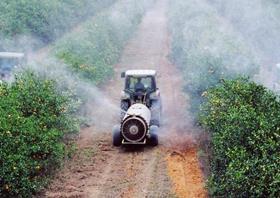
Pesticide residues in fresh produce have long been a controversial topic in the European media, and the crop protection industry has spent years defending its products against food safety claims from environmental groups.
However, on 13 January this year the issue moved decisively in the direction of the food safety critics after the European Parliament had voted in favour of banning 22 active substances from sale in Europe.
The news caused the UK’s Fresh Produce Consortium (FPC) to claim the ability of the European fresh produce industry to supply high quality affordable fruit and vegetables to consumers in a safe, sustainable manner would be jeopardised by the decision.
FPC chief executive Nigel Jenney criticised the EU for making a decision 'with no full assessment of the wider impact on food supply', claiming that the affected products were vital for controlling pests, weeds and diseases.
In Spain, Valencia-based agricultural association La Unió believed the European Parliament's decision could increase production costs and hand an advantage to non-EU exporters.
The association argued that the move 'could lead to an increase in the price of pesticide products, without knowing whether there are economic and efficient substitutes”.
La Unió, which claims the ban could also lead to the creation of a black market for the banned substances, said that the EU urgently needed to carry out research to identify alternative phytosanitary products that do not add to producers' costs.
José Antonio García Fernández, director of Spanish lemon and pomelo association Ailimpo, told Fruitnet.com that he was also worried about the impact of the new legislation on both production and sales in Europe.
'We are extremely concerned that the changes will lead to unfair competition for EU-grown products from fruit and vegetables produced in non EU countries which will not have to adhere to the same standards,' he said.
But, the legislation has by no means been universally condemned by those in the European fresh produce sector.
Italian farming organisation CIA was keen to emphasise that Italy's agricultural sector is already well down this road to eradicating the 22 substances that face the ban.
'It's a fact that Italian agricultural production, in particular fruit and vegetables, is the safest in Europe,' claimed a CIA spokesperson. 'The presence of chemicals continues to be reduced, while organic production is constantly growing.'
Freshfel Europe's general delegate Philippe Binard told Fruitnet.com that while the proposals had positive elements, significant challenges remained – particularly over blacklisted substances.
'Overall, there is a point of concern over when substances are to be withdrawn, and this could lead to confusion for the trade and for consumers,” he said. 'Also, the measures have not considered the impact that there could be on production, as the quality of produce could suffer.'



